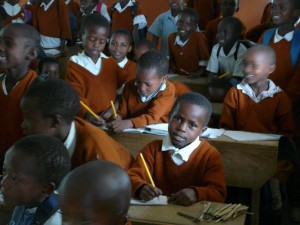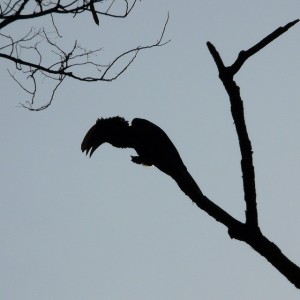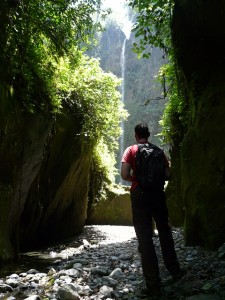 “You’re going to Arusha and you’re not interested in a safari” people were asking us in disbelief. “Are you crazy, there’s nothing to do or see there only a lot of hassle and crime “. Even the (what seemed like hundreds) of local touts and hustlers that descended upon us, as soon as we left the bus, would not believe we wanted to visit this place out of free will. Arusha is the city in Tanzania you go to, to fix a safari and or a Kilimanjaro climb. We had done the safari and had fixed a Kilimanjaro climb already. “So what were we doing here?” we started to think too, when we once again heard all the stories about dangers and crime. “You can’t wear any backpacks on the street not even during daylight. You will be sitting ducks for thieves and muggers”. “Don’t even think about walking back to the hotel after dusk even if it is only a 400m walk: take a taxi!!!”, “Watch out for pickpockets they are all over the place and don’t trust anyone on the street”. The whole ‘Nairobi thing’ all over again.
“You’re going to Arusha and you’re not interested in a safari” people were asking us in disbelief. “Are you crazy, there’s nothing to do or see there only a lot of hassle and crime “. Even the (what seemed like hundreds) of local touts and hustlers that descended upon us, as soon as we left the bus, would not believe we wanted to visit this place out of free will. Arusha is the city in Tanzania you go to, to fix a safari and or a Kilimanjaro climb. We had done the safari and had fixed a Kilimanjaro climb already. “So what were we doing here?” we started to think too, when we once again heard all the stories about dangers and crime. “You can’t wear any backpacks on the street not even during daylight. You will be sitting ducks for thieves and muggers”. “Don’t even think about walking back to the hotel after dusk even if it is only a 400m walk: take a taxi!!!”, “Watch out for pickpockets they are all over the place and don’t trust anyone on the street”. The whole ‘Nairobi thing’ all over again.
So we went out without backpacks, took taxis after 6pm and ignored and sent away anyone who tried to strike a conversation on the streets but we did find some nice things about this city and surroundings.
 The first thing was our hostel. Which was part of a catholic school and seemed like it used to be a missionary post. It was still run by nuns and they did a good job. A nice clean and inexpensive place where we were some of the few non-African guests. At breakfast we met a company of Rwandese women who were very happy to be able to talk some French for a while…and they all seemed to have some family in Brussels. In the afternoon we could lounge on the terrace overlooking the river, with Mount Meru in the distance, watching the sun go down while the beautiful hornbills came flying in.
The first thing was our hostel. Which was part of a catholic school and seemed like it used to be a missionary post. It was still run by nuns and they did a good job. A nice clean and inexpensive place where we were some of the few non-African guests. At breakfast we met a company of Rwandese women who were very happy to be able to talk some French for a while…and they all seemed to have some family in Brussels. In the afternoon we could lounge on the terrace overlooking the river, with Mount Meru in the distance, watching the sun go down while the beautiful hornbills came flying in.
The other thing and the actual reason why we came here were the ‘cultural hikes’ that are being organised in some of the surrounding villages. The concept of these hikes is that travellers can visit these villages and experience some of the ‘real life’ in Tanzania and combine this with a hike to some nice place somewhere on the slopes of Mount Meru. The persons that are guiding, are all young people from the village that are in training to become a ‘tour guide’ or have recently finished their training, giving them the necessary experience to either start working for the local companies. agency. All proceeds of the hike are paid directly to the ‘village chief’ who keeps a neat record of all the proceeds that he needs to account for during the ‘village council’. The proceeds are used to invest in a number of projects such as building of schools. The concept had been launched by the Dutch government in the mid 90’s and had been taken over successfully by the local villages early 2000.
 We went to the Ng’iresi village and did a nice hike to a nearby waterfall. In the village we got to check out among others the primary school, the facilities for the creation of methane gas and a traditional house. I usually try to avoid these visits to ‘traditional villages’ as it all feels very voyeuristic and just ‘wrong’. Somehow this was different, there was no ‘show’ (except for one class of kids bursting into the Swahili version of ‘Frére Jacques’) and it did not feel ‘fake’. We just had a walk through the village and talked to people who wanted to talk to us. Most people were clearly happy to see us (Caro got to feel what it’s like to be superstar when about a hundred kids on the playground wanted to get a ‘high five’ from the blonde girl), some came up to chat with us, while others (often teenagers) could clearly do without these ‘strangers’ around.
We went to the Ng’iresi village and did a nice hike to a nearby waterfall. In the village we got to check out among others the primary school, the facilities for the creation of methane gas and a traditional house. I usually try to avoid these visits to ‘traditional villages’ as it all feels very voyeuristic and just ‘wrong’. Somehow this was different, there was no ‘show’ (except for one class of kids bursting into the Swahili version of ‘Frére Jacques’) and it did not feel ‘fake’. We just had a walk through the village and talked to people who wanted to talk to us. Most people were clearly happy to see us (Caro got to feel what it’s like to be superstar when about a hundred kids on the playground wanted to get a ‘high five’ from the blonde girl), some came up to chat with us, while others (often teenagers) could clearly do without these ‘strangers’ around.
Our guide Emmanuel also explained us a bit more about the tourist industry in the country. It seems that hardly any of the big safari agencies, are controlled by local people. Almost all are in hands of US, European but mostly Indian owners. He was trying to get his own company (website) started. To start he was focussing on these hikes and also some expeditions up Mount Meru and he hoped to someday be able to organize safari’s to big parks or stage expeditions to Mount Kilimanjaro. But the competition with the big foreign agencies will mean an uphill battle or the years to come for our friend.
All in all this ‘cultural hike’ was a hopeful experience. It proved that some of the projects that are launched in the context of ‘foreign aid’ can be integrated and taken over by a local community that learns to be independent from the aid provider. This, in contrast to so many of the other projects that only function as a ‘drip feed’ to a country/community, making it even more dependant because existing local solutions to the problems are completely abandoned while the new ones are not integrated locally. The patient lives on through the drip feed but never recovers…
Allthough I try to avoid it as much as possible, I must admit I did not come to Africa free of prejudice . From the classes on Africa; from my favourite professor at University; Prof. Doom (what’s in a name?), it seemed that for every positive thing coming out of the continent at least three negative things appear.
Unfortunately it seems that more than 10 years after those classes that still is the case. Back in the city, that same night someone explained us on the incredible level of corruption that exists in east African countries causing public facilities to degenerate while government officials fill their pockets. Apart from that despite the crisis, both Kenya and Tanzania appear to do very well economically. However the benefits of this situation are limited to only 5 pct of the population. Middle class is very limited and the majority of the people live in poverty. The high unemployment and poverty rates in some places cause crime to skyrocket. High crime rates keep the tourists away…the vicious circle turns on and on and Arusha seems to be good example.
After our visit to Arusha we moved on to the town of Moshi, which is the jumping off point for Kilimanjaro. For once we did not get the usual ‘safety’ explanations when arriving at the hotel. We could walk mostly where we wanted and did not need to take a taxi home after dark but could walk the 500m to the hotel. It made us happy.
But again the same evening we heard some totally ridiculous story of mismanagement by local government. At the restaurant we shared a table with a German guy, Manuel, who had been volunteering in Tanzania for more than 5 years now. He was returning to Germany from time to time to earn some money to be able to continue volunteering. 2 years ago he had started his own project to help ‘street kids’. Apart from several stories of betrayal and theft from the project by local people, he told us the story that as a volunteer he must pay the government 500 USD every six months for a ‘volunteer permit’. So this guy comes to Tanzania to help out people without getting paid anything for it, he saves his money at home to pay all the charges (housing, food, etc.) and as a ‘thank you’, the Tanzanian government sticks him with a bill of 1000 USD/year for doing what it should be doing itself. Nice! You ask yourself what it takes for such a guy to keep coming back and put up with all this…Definitely one of the bravest person we have met in Africa so far.
[ad-gallery orderby=”menu_order” width=”550px” height=”300px” imagedesc=”none”]

Fijn om dit te lezen aan het begin van onze werkweek 🙂
Ondertussen zijn de temperaturen hier ah kelderen en valt er pakken sneeuw in de Alpen dus geniet er daar maar lekker van. En veel plezier op de Kili. xx
Juf Caroline 😉
Gelukkig ben je een ervaren reisbegeleider, die niet in 7 sloten tegelijk loopt… maar blijf zeker voorzichtig. Caroline als popster vonden we fantastisch!
knuffel mamaroos